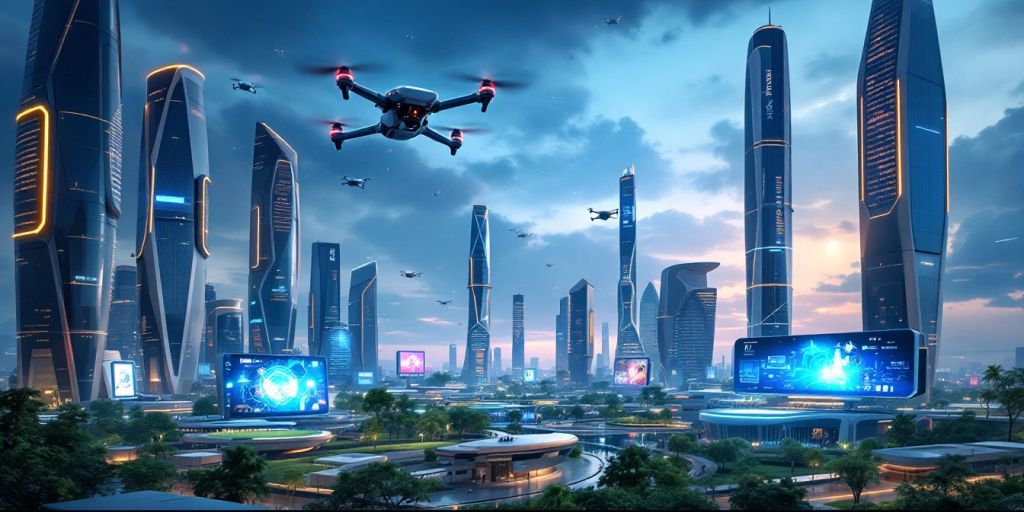
The future of OpenAI AI is bright and full of possibilities. As technology continues to evolve, OpenAI is at the forefront, creating new tools and applications that could change how we live and work. This article will explore how OpenAI’s innovations are shaping the technology landscape and what this means for society.
Key Takeaways
- OpenAI is a leader in AI technology, creating tools that are accessible to everyone.
- Their research focuses on making AI safe and beneficial for all people.
- OpenAI’s models, like GPT, are changing how we interact with technology in everyday life.
- Collaborations with other organizations help OpenAI tackle big challenges in AI.
- OpenAI aims to ensure that AI advancements are ethical and fair for everyone.
The Evolution of OpenAI AI Technologies

Milestones in AI Development
OpenAI was founded in 2015 with a mission to develop safe and beneficial AI. Since then, it has achieved several key milestones:
- 2016: Release of OpenAI Gym, a toolkit for reinforcement learning research.
- 2019: Launch of GPT-2, showcasing advanced natural language processing capabilities.
- 2020: Introduction of GPT-3, further pushing the boundaries of AI language models.
Key Innovations in AI Research
OpenAI has made significant contributions to various fields of AI, including:
- Natural Language Processing: Development of the GPT series, which can generate human-like text.
- Reinforcement Learning: Innovations that enhance AI’s ability to learn from its environment.
- Robotics: Research that improves the interaction between AI and physical systems.
Impact on Various Industries
The advancements in OpenAI technologies have transformed multiple sectors:
- Healthcare: AI-powered tools for medical diagnosis and patient care.
- Education: AI-driven educational assistants that personalize learning experiences.
- Finance: Automated systems for data analysis and decision-making.
OpenAI’s journey reflects its commitment to advancing AI technology while emphasizing ethical considerations and safety. Its innovations are shaping the future of AI and its applications in everyday life.
OpenAI’s Role in Shaping the Future of AI

OpenAI is a key player in the world of artificial intelligence, influencing how AI develops and is used in society. Its mission is to ensure that AI benefits everyone. This commitment shapes the future of AI in several important ways:
Ethical Considerations in AI
- OpenAI focuses on creating AI that is safe and fair.
- It works to prevent bias in AI systems, ensuring they treat everyone equally.
- The organization promotes transparency, helping people understand how AI makes decisions.
Collaborations and Partnerships
OpenAI collaborates with various organizations to enhance AI technology. Some key partnerships include:
- Working with tech companies to improve AI tools.
- Partnering with universities for research and development.
- Engaging with policymakers to shape AI regulations.
Influence on AI Policies
OpenAI plays a significant role in guiding AI policies. It:
- Advocates for responsible AI use.
- Addresses issues like privacy and security.
- Helps create frameworks that ensure AI technologies are used for good.
OpenAI’s efforts in ethical AI development are crucial for ensuring that advancements in technology positively impact society.
In summary, OpenAI’s role in shaping the future of AI is vital. Through its focus on ethics, partnerships, and policy influence, it is paving the way for a future where AI is beneficial for all.
Real-World Applications of OpenAI AI
OpenAI has made a significant impact across various fields by applying its advanced AI technologies. These applications are changing how we live and work.
Healthcare Innovations
- OpenAI’s models help in predicting patient diagnoses more accurately and quickly than traditional methods.
- They analyze vast amounts of medical data to find patterns that humans might miss.
- This technology can speed up treatment planning, which is crucial for saving lives.
Autonomous Driving Technologies
- OpenAI’s algorithms enhance self-driving cars by processing data from sensors.
- They make real-time decisions to improve safety and reduce human error.
- This leads to better traffic management and more efficient routes.
AI in Education
- OpenAI’s tools are used to create personalized learning experiences for students.
- These systems adapt educational content based on individual learning speeds and styles.
- This approach has shown to improve student engagement and outcomes.
OpenAI’s commitment to innovation is evident in its newly released AI product, Swarm, which showcases advances in agentic AI. This is the future of AI.
| Application Area | Key Benefits |
|---|---|
| Healthcare | Faster, more accurate diagnoses |
| Autonomous Driving | Enhanced safety and efficiency |
| Education | Tailored learning experiences |
Advancements in OpenAI’s GPT Models
Overview of GPT-3 and GPT-4
OpenAI’s GPT models have changed how we think about language and technology. GPT-3, released in 2020, is one of the largest language models ever created, with 175 billion parameters. It can write essays, answer questions, and even create poetry. GPT-4 is expected to be even more powerful, with a dataset 100 times larger than GPT-3’s.
Applications of GPT Models
The GPT models are used in many areas, including:
- Content Creation: Writing articles, stories, and reports.
- Customer Support: Answering questions and providing assistance.
- Education: Tutoring students and helping with homework.
Future Prospects of GPT Technology
The future of GPT technology looks bright. Here are some expected advancements:
- Better Understanding: Future models will understand context even better.
- More Languages: They will support more languages and dialects.
- Real-World Interaction: Future models may interact with real-world data and environments.
The evolution of GPT models shows how AI can enhance creativity and problem-solving in everyday life.
OpenAI’s Commitment to Ethical AI
AI Safety and Robustness
OpenAI is dedicated to ensuring that AI technologies are developed with safety and responsibility in mind. This includes the establishment of a safety and security committee responsible for making recommendations on critical safety and security decisions for all OpenAI projects. The goal is to create AI systems that are not only effective but also secure and reliable.
Addressing AI Bias and Fairness
To promote fairness, OpenAI actively works to identify and reduce bias in AI systems. This involves:
- Regular audits of AI models to detect bias.
- Implementing diverse training datasets to ensure representation.
- Engaging with communities to understand their concerns and perspectives.
Transparency in AI Development
Transparency is crucial in building trust with users. OpenAI emphasizes clear communication about how AI systems operate and make decisions. This includes:
- Publishing research findings and methodologies.
- Providing users with insights into data usage and privacy measures.
- Encouraging public dialogue about AI’s societal impacts.
OpenAI believes that ethical AI development is essential for ensuring that the benefits of AI are shared fairly across society. By prioritizing safety, fairness, and transparency, OpenAI aims to lead the way in responsible AI innovation.
The Impact of OpenAI AI on Society
Enhancing Human-AI Interaction
OpenAI’s technologies are changing how we interact with machines. These advancements make it easier for people to communicate with AI systems. For example:
- AI chatbots can answer questions in real-time.
- Virtual assistants help manage daily tasks.
- Language translation tools break down communication barriers.
AI-Driven Solutions for Global Challenges
OpenAI is also working on solutions to big problems facing the world today. Some areas where AI is making a difference include:
- Healthcare: AI tools help doctors diagnose diseases faster.
- Climate Change: AI models predict environmental changes and suggest solutions.
- Education: AI tutors provide personalized learning experiences for students.
OpenAI aims to create a future where technology and humanity work together for the greater good.
Future Trends in AI Integration
As AI continues to grow, we can expect:
- More collaboration between humans and AI in various fields.
- Increased focus on ethical AI practices to ensure fairness and safety.
- Wider access to AI tools, allowing more people to benefit from these technologies.
Comparing OpenAI with Other AI Research Organizations
OpenAI vs. DeepMind
OpenAI and DeepMind are two major players in the AI field, but they have different focuses. OpenAI aims to ensure that AI benefits everyone, while DeepMind, owned by Google, concentrates on solving complex problems through deep learning. Both organizations have made significant contributions, but their missions set them apart.
OpenAI vs. IBM Watson
IBM Watson has a more business-oriented approach, focusing on specific applications like healthcare and enterprise solutions. In contrast, OpenAI takes a broader view, emphasizing open research and ethical considerations. This difference in focus leads to varied impacts on technology and society.
Unique Strengths of OpenAI
OpenAI has several unique strengths that distinguish it from other organizations:
- Ethical Framework: OpenAI prioritizes ethical AI development, ensuring that advancements are beneficial to all.
- Open Research: The organization promotes transparency by sharing its research and findings with the public.
- Collaborative Efforts: OpenAI partners with various companies to enhance AI applications across different sectors.
| Organization | Focus Area | Key Strengths |
|---|---|---|
| OpenAI | General AI | Ethical framework, open research |
| DeepMind | Deep Learning | Problem-solving, reinforcement learning |
| IBM Watson | Business Solutions | Application-specific AI, enterprise focus |
OpenAI’s lead over other AI companies has largely vanished, highlighting the competitive landscape of AI research today.
In summary, while OpenAI, DeepMind, and IBM Watson all contribute to AI advancements, their differing missions and approaches create a diverse landscape in the field of artificial intelligence.
Conclusion
In summary, the future of OpenAI and its role in technology is bright and full of promise. As we move forward, it’s clear that OpenAI is not just about creating advanced AI tools; it’s about making sure these tools help everyone. The focus on customizing solutions means that businesses can better meet the needs of their customers. OpenAI’s research is changing many areas, like healthcare and education, by making processes faster and more accurate. Their commitment to safe and fair AI development is also important, as it helps prevent misuse and ensures that technology benefits society as a whole. Looking ahead, the goal is to create a world where AI works alongside humans, improving lives without taking over. This partnership between technology and people is essential for a better future.
Frequently Asked Questions
What is OpenAI?
OpenAI is a research organization that focuses on developing artificial intelligence (AI) in ways that are safe and beneficial for everyone.
What are GPT models?
GPT models, like GPT-3 and GPT-4, are advanced AI systems created by OpenAI that can understand and generate human-like text.
How does OpenAI impact different industries?
OpenAI’s technologies are used in various fields, including healthcare for better diagnostics, in cars for self-driving features, and in education for personalized learning.
Why is ethical AI important?
Ethical AI ensures that artificial intelligence is developed responsibly, avoiding biases and ensuring that it benefits all people.
What collaborations does OpenAI engage in?
OpenAI works with universities, other tech companies, and policymakers to promote safe and effective AI development.
How can I use OpenAI’s technologies?
Developers can access OpenAI’s technologies through APIs, allowing them to build their own applications using advanced AI.


